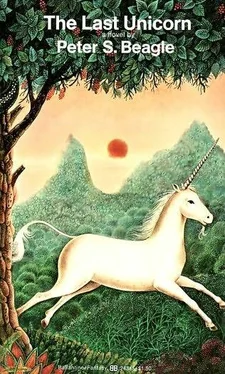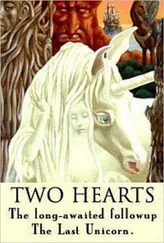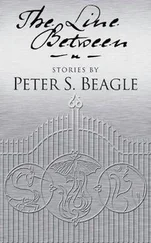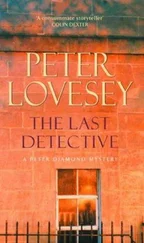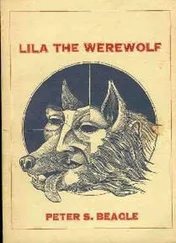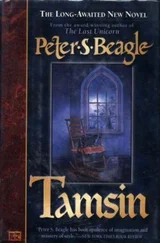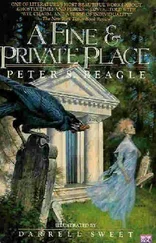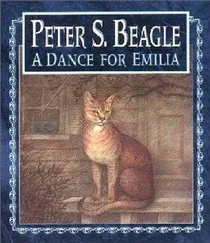Nearby, Prince Lír sang, "Others may offer more than they can give, All that they have for as long as they live…" The Lady Amalthea closed her hands on the parapet and wished for him to come to her, for she knew now that King Haggard was mad. Below them lay the thin, sallow beach, and the rocks, and the rising tide, and nothing more.
"I like to watch them. They fill me with joy." The childish voice was all but singing. "I am sure it is joy. The first time I felt it, I thought I was going to die. There were two of them in the early morning shadows. One was drinking from a stream, and the other was resting her head on his back. I thought I was going to die. I said to the Red Bull, 'I must have that. I must have all of it, all there is, for my need is very great. So the Bull caught them, one by one. It was all the same to the Bull. It would have been the same if I had demanded tumblebugs or crocodiles. He can only tell the difference between what I want and what I do not want."
He had forgotten her for the moment as he leaned over the low wall, and she might have fled the tower then. But she stayed where she was, for an old bad dream was waking all around her, though it was daylight. The tide shattered on the rocks and tumbled together again, and Prince Lír rode along singing, "But I will love you as long as I can, And never ask if you love me."
"I suppose I was young when I first saw them," King Haggard said. "Now I must be old — at least I have picked many more things up than I had then, and put them all down again. But I always knew that nothing was worth the investment of my heart, because nothing lasts, and I was right, and so I was always old. Yet each time I see my unicorns, it is like that morning in the woods, and I am truly young in spite of myself, and anything can happen in a world that holds such beauty."
In the dream I looked down at four white legs, and felt the earth under split hoofs. There was a burning on my brow, as there is now. But there were no unicorns coming in on the tide. The king is mad. He said, "I wonder what will become of them when I am gone. The Red Bull will forget them immediately, I know, and be off to find a new master, but I wonder if they will take their freedom even then. I hope not, for then they will belong to me forever."
Then he turned to look at her again, and his eyes were as gentle and greedy as Prince Lír's eyes became when he looked at her. "You are the last," he said. "The Bull missed you because you were shaped like a woman, but I always knew. How did you manage the change, by the way? Your magician couldn't have done it. I don't think he could turn cream into butter."
If she had let go of the parapet she would have fallen, but she answered him quite calmly, "My lord, I do not understand. I see nothing at all in the water."
The king's face shivered as though she were looking at him through fire. "Do you still deny yourself?" he whispered. "Do you dare deny yourself? Nay, that's as false and cowardly as though you were truly human. I'll hurl you down to your folk with my own hands if you deny yourself." He took a step toward her, and she watched him with her eyes open, unable to move.
The tumult of the sea filled her head, together with Prince Lír's singing and the blubbering death wail of the man named Rukh. King Haggard's gray face hung over her like a hammer, muttering, "It must be so, I cannot be mistaken. Yet her eyes are as stupid as his — as any eyes that never saw unicorns, never saw anything but themselves in a glass. What cheat is this, how can it be? There are no green leaves in her eyes now."
Then she did close her eyes, but she shut in more than she kept out. The bronze-winged creature with a hag's face swung by, laughing and prattling, and the butterfly folded its wings to strike. The Red Bull moved silently through the forest, pushing the bare branches aside with his pale horns. She knew when King Haggard went away, but she did not open her eyes.
It was long after, or only a little while later, that she heard the magician's voice behind her. "Be still, be still, it's over." She had not known that she was making any sound.
"In the sea," he said. "In the sea. Well, don't feel too bad about it. I didn't see them either, not this time or any other that I've stood here and watched the tide coming in. But he saw them — and if Haggard sees something, it's there." He laughed with a sound like an ax falling on wood. "Don't feel bad. This is a witch-castle, and it's hard to look closely at things, living here. It's not enough to be ready to see — you have to be looking all the time." He laughed again, more gently. "All right," he said. "We'll find them now. Come on. Come with me."
She turned to him, moving her mouth to make words, but no words came out. The magician was studying her face with his green eyes. "Your face is wet," he said worriedly. "I hope that's spray. If you've become human enough to cry, then no magic in the world — oh, it must be spray. Come with me. It had better be spray."
In the great hall of King Haggard's castle, the clock struck six. Actually, it was eleven minutes past midnight, but the hall was little darker than it had been at six o'clock, or at noon. Yet those who lived in the castle told time by the difference in the dark. There were hours when the hall was cold simply for want of warmth and gloomy for lack of light; when the air was stale and still, and the stones stank of old water because there were no windows to let in the scouring wind. That was daytime.
But at night, as some trees hold a living light all day, hold it with the undersides of their leaves until long after sundown — so at night the castle was charged and swarming with darkness, alive with darkness. Then the great hall was cold for a reason; then the small sounds that slept by day woke up to patter and scratch in the corners. It was night when the old smell of the stones seemed to rise from far below the floor.
"Light a light," Molly Grue said. "Please, can you make a light?"
Schmendrick muttered something curt and professional. For a moment nothing happened, but then a strange, sallow brightness began to spread over the floor, scattering itself about the room in a thousand scurrying shards that shone and squeaked. The little night beasts of the castle were glowing like fireflies. They darted here and there in the hall, raising swift shadows with their sickly light and making the darkness even colder than before.
"I wish you hadn't done that," Molly said. "Can you turn them off again? The purple ones, anyway, with the — with the legs, I guess."
"No, I can't," Schmendrick answered crossly. "Be quiet. Where's the skull?"
The Lady Amalthea could see it grinning from a pillar, lemon-small in the shadows and dim as the morning moon, but she said nothing. She had not spoken since she came down from the tower.
"There," the magician said. He strode to the skull and peered into its split and crumbling eyesockets for a long time, nodding slowly and making solemn sounds to himself. Molly Grue stared with equal earnestness, but she glanced often at the Lady Amalthea. At last Schmendrick said, "All right. Don't stand so close."
"Are there really spells to make a skull speak?" Molly asked. The magician stretched out his fingers and gave her a small, competent smile.
"There are spells to make everything speak. The master wizards were great listeners, and they devised ways to charm all things of the world, living and dead, into talking to them. That is most of it, being a wizard — seeing and listening." He drew a long breath, suddenly looking away and rubbing his hands together. "The rest is technique," he said. "Well. Here we go."
Abruptly he turned to face the skull, put one hand lightly on the pale crown, and addressed it in a deep, commanding voice. The words marched out of his mouth like soldiers, their steps echoing with power as they crossed the dark air, but the skull made no answer at all.
Читать дальше
